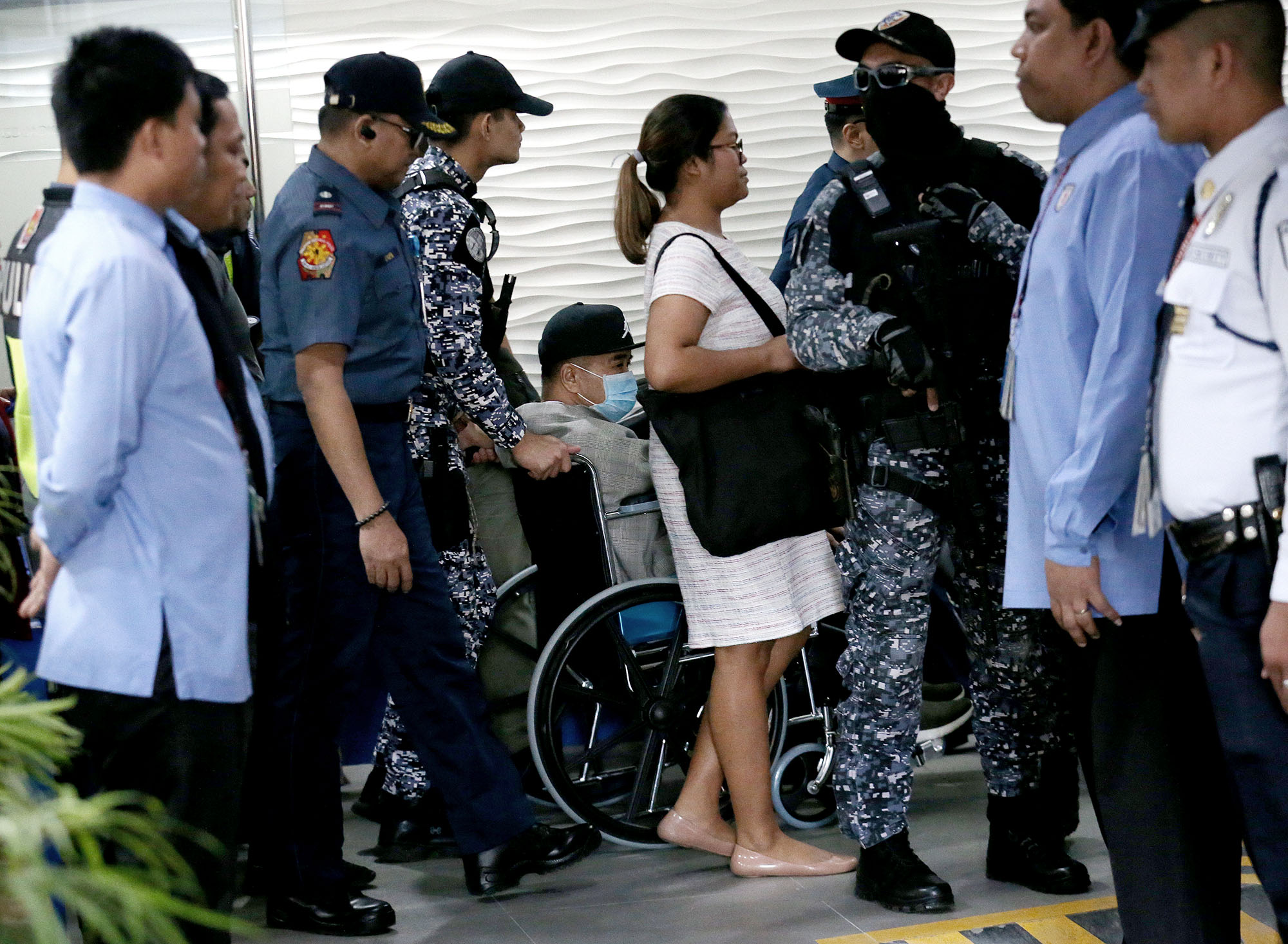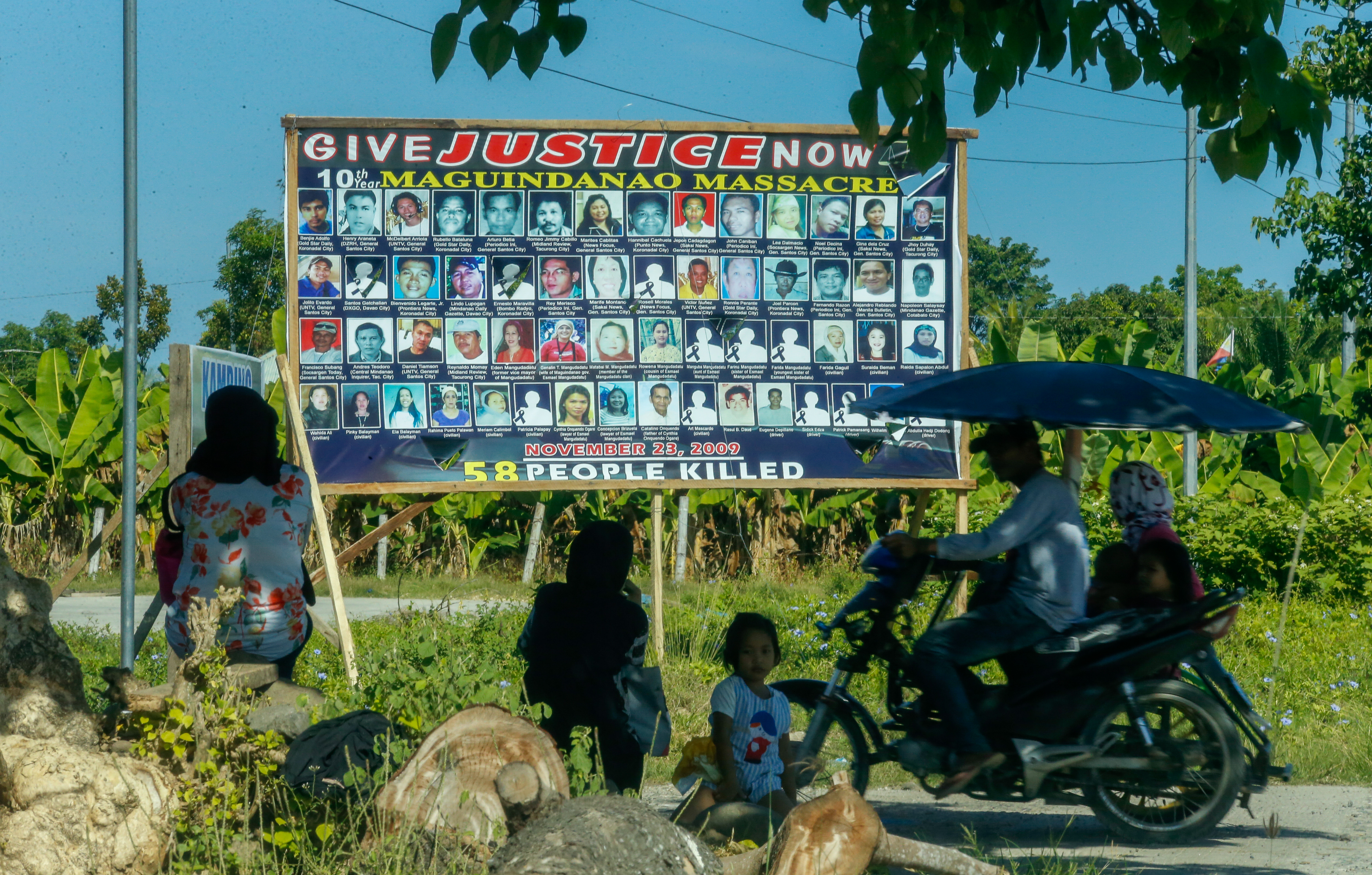Judgment day: P20M per massacre victim sought

BACK TO JAIL His bid for an extension of his hospital confinement for a stroke rejected by Judge Jocelyn Solis-Reyes, former Autonomous Region in Muslim Mindanao Gov. Zaldy Ampatuan is taken back to jail at Camp Bagong Diwa on Wednesday. He and more than a hundred others, including brother Andal Ampatuan Jr., face judgment
on Thursday for the Nov. 23, 2009, Maguindanao massacre. —RICHARD A. REYES
MANILA, Philippines — Besides possibly drawing long prison terms, the alleged perpetrators of the Philippines’ worst political violence may also be ordered to pay hefty amounts in damages to the families of the 58 people, including 32 journalists, they killed in Maguindanao province a decade ago when the Quezon City court hands down its decision on Thursday.
Prosecution lawyers say they have entered into the records the civil aspect of the case, which includes seeking from the accused compensation for the families of the victims.
Harry Roque, a lawyer for some of the families, on Wednesday said the prosecution had asked the court to order the accused to pay each of the complainants P20 million in civil damages.
Obligation of the state
He said the compensation could enable the families to cope with their loss and deal with the mental anguish they suffered “as a result of the inhumane manner by which their loved ones were killed.”
“Further, since most of the victims were breadwinners, their (the families’) loss of earning capacity should be compensated,” Roque said.
Article continues after this advertisement“Exemplary damage[s are] also warranted to serve as example to others and to send the message that the murder, particularly of [journalists] will not be sanctioned by the state,” he added.
Article continues after this advertisementNo matter what the judgment will be, paying compensation to the families is a separate obligation of the state and an active call of the complainants to the government, Gilbert Andres, another lawyer for the families, said on Friday.
“We’ve always been [saying the] state should offer compensation to all the victims of the Maguindanao massacre. The theory there is that the right to life is one of the obligations of the state and the state failed to protect the right to life. The fact that [the massacre] happened, the state had already failed to protect the right to life,” Andres, from the Center for International Law, said.
He added that pyschosocial support should also be given to the families, including education for the children of the victims.
Close to 200 people, including leaders of the powerful Ampatuan family, who ruled the impoverished province of Maguindanao, are charged with organizing the Nov. 23, 2009, mass killing in a bid to quash an election challenge from the rival Mangudadatu clan.
The brazen attack was carried out in broad daylight on a convoy carrying the wife of Maguindanao gubernatorial candidate Esmael Mangudadatu, relatives, lawyers and the journalists, who were stopped at a police-manned checkpoint, hauled to a rise above the road, killed in a hail of gunfire, then dumped into pits dug the day before with a backhoe.
Of the original 197 suspects, 117 have been arrested and tried, and 80 have remained at large, including 15 members of the Ampatuan family. Each of the 197 has been charged with 58 counts of murder.

JUSTICE IS COMING A billboard with pictures of the 58 victims of the Nov. 23, 2009, Maguindanao massacre stands on a side of the road to Barangay Salma Ampatuan in Maguindanao province, where they were stopped by gunmen that included members of the Ampatuan political clan, hauled up a rise above the road, and mowed down. —JEOFFREY MAITEM
Day of judgment
Judge Jocelyn Solis-Reyes of the Quezon City Regional Trial Court Branch 221, which holds proceedings at Camp Bagong Diwa in Taguig City, hands down her decision on Thursday, more than 10 years after the mass killing.
Among the alleged perpetrators facing judgment are former Datu Unsay Mayor Andal Ampatuan Jr., the alleged leader of the killing force, and former Autonomous Region in Muslim Mindanao Gov. Zaldy Ampatuan, who had a stroke on Oct. 21 and was confined in Taguig-Pateros District Hospital.
Judge Reyes rejected his bid for an extension of his confinement and ordered him returned to jail. He was taken back to jail at Camp Bagong Diwa on Wednesday afternoon.
The family patriarch, former Maguindanao Gov. Andal Ampatuan Sr., who allegedly gave the order for the mass killing, died in jail in 2015.
Traveling to Manila for the trial has been a challenge for the families of the victims, who live in General Santos City, South Cotabato, Sultan Kudarat and Maguindanao.
Nena Santos, a lawyer for the families of 38 victims, said on Monday funds had been raised to enable the complainants to come to Manila for the promulgation.
The public will be able to watch the proceedings on television through a live coverage provided by the Supreme Court’s public information office.
Two cameras will be set up inside the courtroom. One will be directed at the judge and whoever will read the decision. The other will be directed at the parties, their lawyers and the public.
The live coverage will be broadcast through accredited television networks.
Tight security
Brig. Gen. Debold Sinas, acting National Capital Region Police Office chief, said about 700 policemen would be deployed to secure Camp Bagong Diwa during the promulgation.
The head of the panel of public prosecutors, Senior Deputy State Prosecutor Richard Fadullon, said the group was taking the security measures seriously.
“For as long as the other [accused] are still out there, there is that security threat,” Fadullon said.
New York-based Human Rights Watch on Wednesday urged the Supreme Court to create a special division that will handle appeals of potential guilty verdicts.
“The high court could be inundated, and the appeals process could last for years and years, delaying justice even further,” said Phil Robertson, the group’s director for Asia. “The Supreme Court should consider designating a special division that will handle appeals of the verdicts.”
—With reports from Dexter Cabalza, Dona Z. Pazzibugan, and Patricia Denise M. Chiu